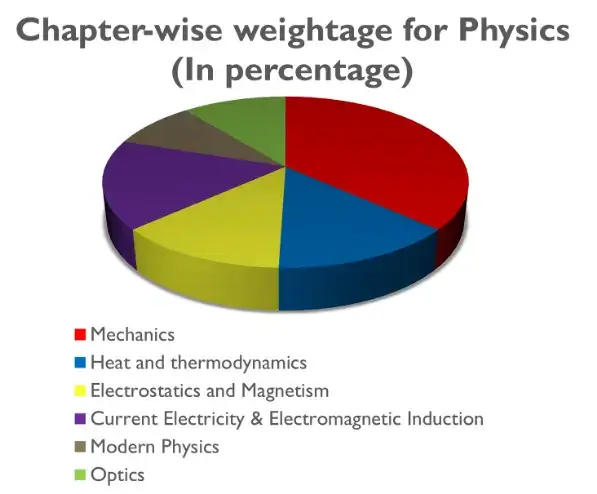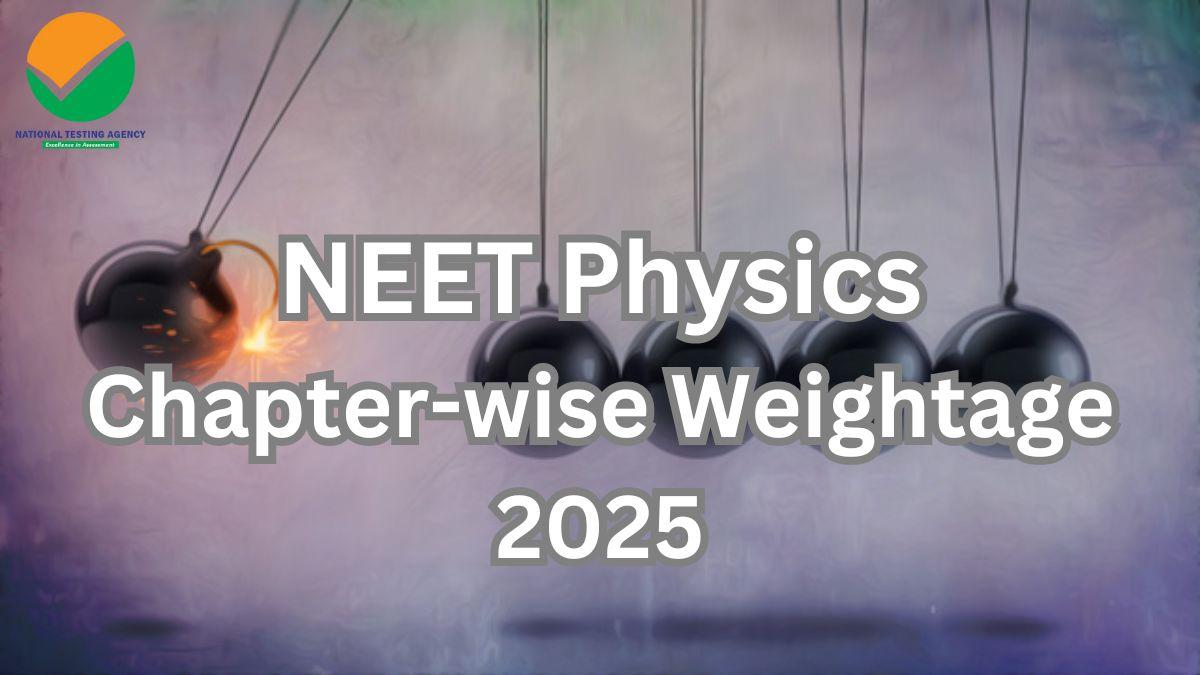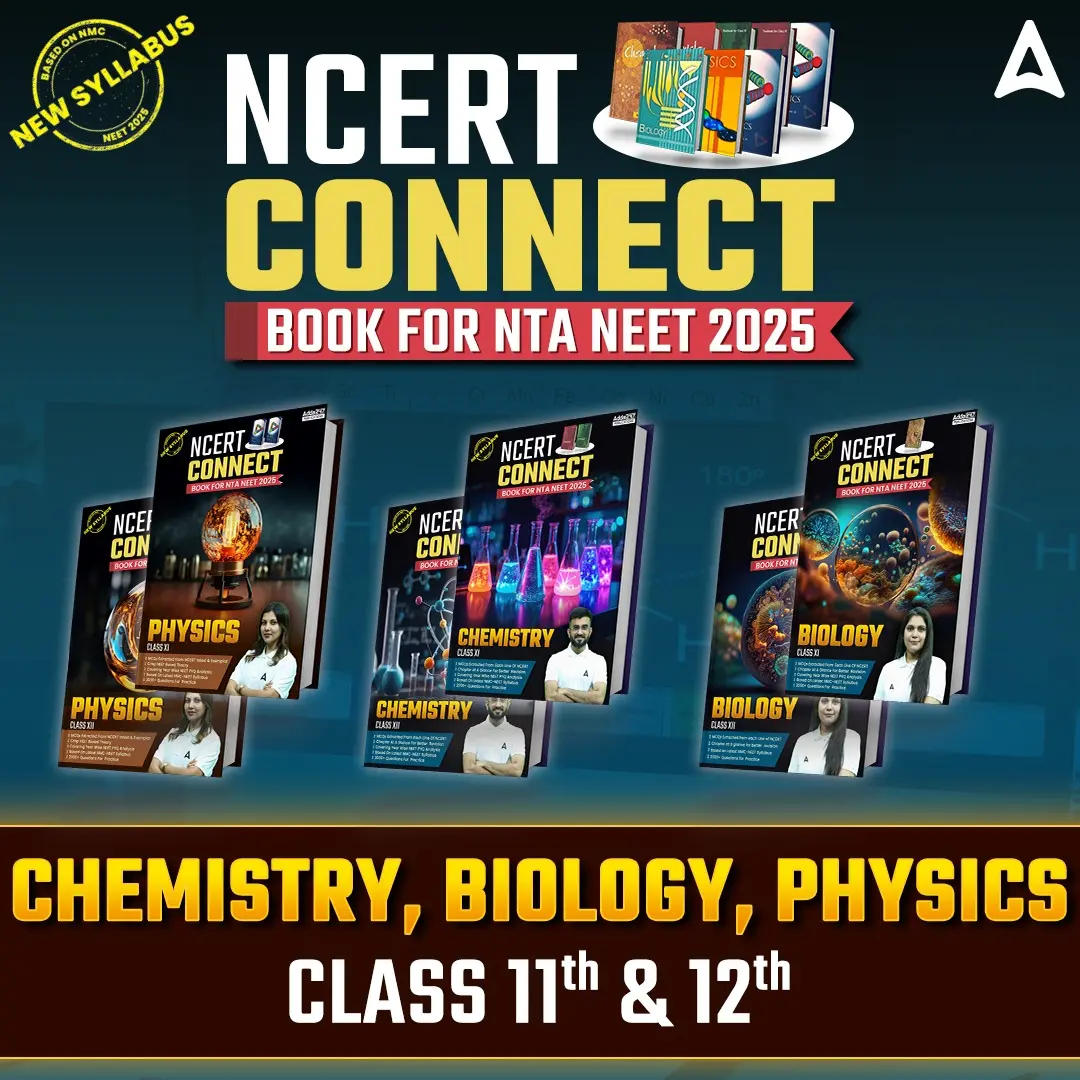Table of Contents
Physics is the toughest section in the NEET exam when compared to the Biology and Chemistry sections. This is why, it is often said that the marks in the physics section of the NEET exam determine the rank of a candidate. It is not only important to score good marks in the NEET physics subject to get a good score but also to achieve a better rank. This is why ,we are providing students with the NEET Physics Chapter-wise Weightage 2025 in this article.
NEET Physics Chapter wise Weightage 2025
It is important to know about the Physics chapter-wise weightage 2025 in order to give a good performance in the NEET 2025 physics section. Candidates have described the physics section of the NEET exam as difficult over the years since it requires a strong grasp of physics topics and conceptual clarity in order to apply learned information to numerical-based problems.
As long as there are mathematics and reasoning involved, this part is frequently referred to as tricky. However, Physics becomes a piece of cake on exam day when you rank topics according to their significance as determined by historical trends. We have provided you with the NEET Physics important topics along with the chapter-wise number of questions and weightage to help you crack NEET UG 2025 with flying colors.
NEET Physics Weightage 2025: Question Distribution
The NEET Physics syllabus covers a wide range of topics from both Class 11 and Class 12. Having a good grasp of the importance of NEET Physics 2025 weightage is essential for students so they can plan their study schedule efficiently.
Candidates can concentrate on the chapters with more weightage to strategically target their studies for better results. The tables below provide the chapter-wise weightage for the NEET 2025 pdf by NTA to help candidates prepare effectively.
| Name of the Chapter or Topic |
No of Questions (based on analysis)
|
Weightage (in percentage)
|
| Mechanical Properties of Solids | 1 | 2% |
| Moving Charges and Magnetism | 2 | 5% |
| Center of Mass & System of Particles | 1 | 2% |
| Wave Optics | 1 | 2% |
| Electromagnetic Induction | 1 | 3% |
| Mechanical Properties of Fluids | 2 | 3% |
| Electromagnetic Waves | 2 | 3% |
| Rotational Motion | 3 | 6% |
| Oscillations | 1 | 3% |
| Ray Optics and Optical Instruments | 3 | 6% |
| Kinetic Theory of Gases | 1 | 3% |
| Dual Nature of Radiation and Matter | 2 | 3% |
| Gravitation | 2 | 3% |
| Current Electricity | 5 | 10% |
| Semiconductor Electronics: Materials, Devices and Simple Circuits | 3 | 5% |
| Units and Measurements | 3 | 5% |
| Work Energy and Power | 2 | 3% |
| Electric Charges and Fields | 2 | 3% |
| Magnetism and Matter | 1 | 1% |
| Atoms | 1 | 3% |
| Nuclei | 2 | 4% |
| Motion in a Plane | 1 | 3% |
| Mathematical Tools & Vectors | 1 | 1% |
| Laws of Motion | 1 | 2% |
| Thermodynamics | 1 | 2% |
| Waves | 1 | 1% |
| Electrostatic Potential and Capacitance | 3 | 5% |
| Alternating Current | 2 | 4% |
| Thermal Properties of Matter | 0 | 1% |
| Motion in a Straight Line | 1 | 3% |
NEET Physics Class 11 Chapter-wise Weightage
Class 11 Physics is crucial in the NEET exam, serving as the foundation for comprehending advanced ideas in the medical sector. It is crucial for candidates to have a deep understanding of the concepts in class 11 Physics as a lot of exam questions are based on them. Refer to the chart provided to obtain information on the weightage of NEET for the 11th modern Physics chapters.
| Unit Number | Name of the Chapter or Topic |
Weightage (in percentage)
|
|
I |
Physical-world and measurement |
2% |
|
Chapter–1: Physical World |
||
|
Chapter–2: Units and Measurements |
||
|
II |
Kinematics |
3% |
|
Chapter–3: Motion in a Straight Line |
||
|
Chapter–4: Motion in a Plane |
||
|
III |
Laws of Motion |
3% |
|
Chapter–5: Laws of Motion |
||
|
IV |
Work, Energy and Power |
4% |
|
Chapter–6: Work, Energy and Power |
||
|
V |
Motion of System of Particles and Rigid Body |
5% |
|
Chapter–7: System of Particles and Rotational Motion |
||
|
VI |
Gravitation |
2% |
|
Chapter–8: Gravitation |
||
|
VII |
Properties of Bulk Matter |
3% |
|
Chapter–9: Mechanical Properties of Solids |
||
|
Chapter–10: Mechanical Properties of Fluids |
||
|
Chapter–11: Thermal Properties of Matter |
||
|
VIII |
Thermodynamics |
9% |
|
Chapter–12: Thermodynamics |
||
|
IX |
Behaviour of Perfect Gas and Kinetic Theory |
3% |
|
Chapter–13: Kinetic Theory |
||
|
X |
Oscillation & Waves |
3% |
|
Chapter–14: Oscillations |
||
|
Chapter–15: Waves |
NEET Physics Class 12 Chapter-wise Weightage
In the NEET exam, the importance of class 12 Physics is highlighted due to its significant weightage, underscoring its crucial role in the overall readiness of future medical students. Mastering NEET physics chapter wise questions importance not only guarantees a solid base but also improves problem-solving abilities, crucial for the medical entrance examination.
Refer to the table provided below to identify the chapters with the highest weightage in NEET Physics from class 12. The class 12 physics syllabus accounts for nearly 50% questions and marks in NEET Physics. The following table has been prepared on the basis of analysis done by the experts.
| Unit Number | Name of the Units with Chapters |
Weightage (in percentage)
|
|
I |
Electrostatics |
9% |
|
Chapter-1: Electric Charges and Fields |
||
|
Chapter-2: Electrostatic Potential and Capacitance |
||
|
II |
Current Electricity |
8% |
|
Chapter-3: Current Electricity |
||
|
II |
Magnetic Effect of Current & Magnetism |
5% |
|
Chapter-4: Moving Charges and Magnetism |
||
|
Chapter-5: Magnetism and Matter |
||
|
IV |
Electromagnetic Induction & Alternating Current |
8% |
|
Chapter-6: Electromagnetic Induction |
||
|
Chapter-7: Alternating Current |
||
|
V |
Electromagnetic Waves |
5% |
|
Chapter-8: Electromagnetic Waves |
||
|
VI |
Optics |
10% |
|
Chapter-9: Ray Optics and Optical Instruments |
||
|
Chapter-10: Wave Optics |
||
|
VII |
Dual Nature of Matter and Radiation |
6% |
|
Chapter-11: Dual Nature of Radiation and Matter |
||
|
VIII |
Atoms & Nuclei |
3% |
|
Chapter-12: Atoms |
||
|
Chapter-13: Nuclei |
||
|
IX |
Electronic Devices |
9% |
|
Chapter-14: Semiconductor Electronics |
NEET Physics Chapter Wise Questions
Candidates studying for the NEET Physics portion should examine the topic-wise question allocation from all chapters, as shown in the table below. This assists in gaining a better understanding of the topics that should be given greater emphasis and can result in positive outcomes in the examination.

| NEET Physics 2025 Topics for Question Paper | |
| Topic |
Number of Questions
|
| Alternating Current – Average, peak and rms values | 3 |
| Capacitance – Definition of capacitance | 1 |
| Current Electricity – Definition of Current, Current Densities, Drift | 5 |
| Surface Tension – Surface tension, Surface energy and capillary rise | 1 |
| Wave Optics – Principle of superposition, path difference, Wavefronts, and coherence | 1 |
| Projectile Motion – Definition, Projectile on a horizontal plane | 1 |
| Friction – Kinetic friction | 1 |
| Gravitation – Universal law of gravitation | 2 |
| Modern Physics – Photoelectric Effect | 5 |
| Rigid Body Dynamics – Kinematics | 5 |
| Sound Wave – Equation of sound wave, wavelength, frequency, pressure and displacement amplitude | 1 |
| Geometric Optics – Plane Mirror | 3 |
| Electromagnetic Waves | 2 |
| Newton’s Law of Motion – Type of forces, newton’s third law, free body diagram | 1 |
| KTG and Thermodynamics – Kinetic Theory of gases | 2 |
| Solid and Semiconductor – Semiconductor, Energy Band | 3 |
| Measurement Error | 2 |
| Electro Magnetic Field – Magnet and Magnetic field due to a moving charge | 3 |
| Electro Magnetic Induction – Flux and Faraday’s laws of electromagnetic induction | 1 |
| Electrostatics – Properties of charge and Coulomb’s Law | 3 |
| Rectilinear Motion – Distance and Displacement | 2 |
| Fluid Mechanics – Measurement and calculation of pressure | 1 |
| Work, Power, Energy – Work Done By Constant Force | 2 |
| Elasticity and Viscosity – Elastic behavior longitudinal stress, young modulus | 2 |
| Simple Harmonic Motion – Equation of SHM | 1 |
NEET 2025 Physics Important Topics
Some key topics in the NEET 2025 Physics Syllabus Class 11 are the Physical World and Measurement, Kinematics, Laws of Motion, Work, Energy, and Power, and Thermodynamics. These subjects are essential and form the foundation for more complex ideas explored in Class 12. Gaining proficiency in these areas is crucial for building a solid base in physics, allowing students to successfully approach more challenging problems.
| Name of the Chapter |
Important Topics
|
| Units and Measurements |
|
| Mathematical Tools |
|
| Motion in a Straight Line |
|
| Motion in a Plane |
|
| Newton’s Laws of Motion |
|
| Work, Power and Energy |
|
| Centre of Mass & System of Particles |
|
| Rotational motion |
|
| Gravitation |
|
| Mechanical Properties of Solids |
|
| Thermal Properties of Matter |
|
| Kinetic Theory of Gases |
|
| Thermodynamics |
|
| Oscillations |
|
| Waves |
|
Understanding the chapter weightage of the NEET Physics syllabus is critical for successful preparation. Analyzing high-weightage themes with a strategic approach allows you to prioritize crucial concepts, focus on areas that demand more attention, and increase your chances of success in NEET. Furthermore, understanding the weightage allows you to adjust your study strategy to cover all relevant topics while avoiding less vital ones.






 NTA NEET Cut Off 2025, Expected Cutoff f...
NTA NEET Cut Off 2025, Expected Cutoff f...
 Courses Offered Through NEET Other than ...
Courses Offered Through NEET Other than ...
 Best Career Options After NEET, Check NE...
Best Career Options After NEET, Check NE...



